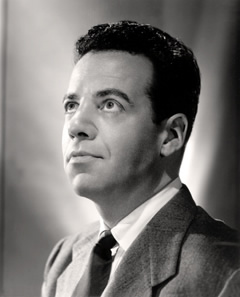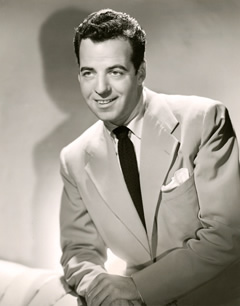SPOTLIGHT ARTICLE
TOUGH GUY WITH A HEART
The Career of Gerald Mohr
By Elizabeth McLeod
One of the most familiar advertising characters of the 1940s was a stripe-shirted, stubble-faced cartoon "Tough Guy." A stereotypical goon, he was always shown picking daisies, petting kittens, cuddling babies, or otherwise living up to the slogan of his sponsor, a manufacturer of automotive piston rings that promised their product was "Tough -- But Oh So Gentle." That slogan applies equally well to one of radio's toughest, yet most nuanced character actors, Gerald Mohr.
Mohr looked as much like a tough guy as any actor could -- not classically handsome, but good-looking in a craggily-masculine sort of way. He was the sort of actor you could expect to see portraying rugged, manly, but thoughtful character roles. But, it wasn't Gerald Mohr's face that made his fortune, it was his voice. His rich, textured baritone got him into radio in the 1930s, and kept him busy for the next twenty years.
Gerald Mohr was a New Yorker by birth, entering the world in 1914 as the child of a prosperous, upper-middle-class family. He enjoyed all of the privileges connected to that upbringing -- a close-knit family life, a prestigious education, and exposure to high culture. He was interested in theatre, literature, and music, and those connections all led him to a career in local New York radio while still a student. As a staff member at station WABC, a key station of the Columbia Broadcasting System, Mohr's voice described a variety of special events -- including the burning of the Morro Castle, an ocean liner that foundered off the coast of New Jersey in 1938, claiming the lives of 137 people. Gerald Mohr was just 19 years old, but he was on the way to a lifelong career. His early ambitions to follow in his grandfather's footsteps as a psychologist quickly gave way to dreams of show business.
 Gerald Mohr Gerald Mohr |
It was during his time at WABC that his voice caught the attention of Orson Welles, who was always on the lookout for new talent for his nascent Mercury Theatre, a company of bright young performers with a taste for the experimental. Mohr's time with the Mercury was brief, but it got him noticed by the mainstream theatre. In 1935, he made an impression in a small part as a thug alongside Humphrey Bogart in the stage production of The Petrified Forest. Further Broadway roles followed, but radio remained a valuable sideline for the young actor. When he moved to Hollywood, he became a regular voice in various west-coast transcription series, and by the end of the 1930s he was one of Hollywood radio's busiest character actors. Film work also beckoned, with Mohr following the footsteps of his old stage colleague Bogart in playing rugged anti-heroes and thoughtful villains in low-budget productions. But, while Bogart himself ascended quickly to A-picture stardom, Mohr remained a fixture in B films. After his World War II military service in the Air Corps, he settled into a career as the "Bogart of the B's."
Radio gave him greater opportunities to flex his acting talent. As far back as 1938, he had starred as comic-strip adventure hero "Jungle Jim" in a widely-syndicated transcription series for Hearst Newspapers. He was practically a regular on Jean Hersholt's small-town medical drama Dr. Christian (usually in antagonist roles, but sometimes in more sympathetic parts), and he could often be found in the second tier of the cast on the Lux Radio Theatre or the Cavalcade of America. When he returned from his military service, however, he was ready for bigger things...
(READ THE REST OF THIS ARTICLE BELOW)
|
Featured Radio Collections
|

Raymond Chandler's tough, capable, smart-talking creation Philip Marlowe is one of the best-known fictional investigators in America. Through Marlowe's gaze, the translucent light of the L.A. basin comes to life, the nighttime smell of jasmine and sage, the sudden storms that cause traffic wrecks, and the desert winds that set nerves on edge.
Van Heflin and Gerald Mohr each play the title role in these electric episodes, cracking wise with the of angry glee of a take-charge operative who careens, cajoles, shoves, shouts, and sometime shoots his way to a solution in his quest for a stolen object, a missing person, or a killer needing to be found. Includes two Van Heflin episodes never before available to the public since their original broadcast.

|
 MORE DETAILS MORE DETAILS

|
|

An eminently appealing character, Dollar was pragmatic, flirtatious, and sympathetic (to a point) - better at reserving judgment than he was at restraining his impulses. This 10 CD set brings you the voices of all eight men who took on the role of "America's fabulous freelance insurance investigator" - from the well known to the obscure - including the two actors who only appeared in audition recordings.
Featured here are Dick Powell, Charles Russell, Edmund O'Brien, John Lund, Gerald Mohr, Bob Bailey, Bob Readick, and Mandel Kramer (who had the distinction of being the very last leading man in a network radio drama).

|
 MORE DETAILS MORE DETAILS

|
|
He returned to the studio just in time for the latest broadcast fad. The hardboiled detective was just coming into his own in the years following the war, and that meant plenty of work for a man with a rugged-yet-thoughtful voice and image. The character of Philip Marlowe, author Raymond Chandler's legendary Los Angeles private eye, had first come to radio in a Lux Radio Theatre production in 1945, played by Dick Powell. However, Powell was starring as Richard Diamond when the time came for Marlowe to have his own series. After a brief trial run (with screen star Van Heflin) had come and gone, Gerald Mohr got the job.
It was in many ways a back-to-basics approach for the hard-boiled-dick idea. Even by the time Mohr was hired in 1948, the conventional style of the private-eye drama had already become a cliché -- overwrought narration, implausible plots, the sex angle -- and it had been thoroughly parodied by William Spier and Howard Duff in The Adventures of Sam Spade, which was itself parodied by Blake Edwards and Dick Powell in The Adventures of Richard Diamond. But, Gerald Mohr's Philip Marlowe was no tongue-in-cheek tough guy, wisecracking his way thru each "caper" with a wink and a leer. He wouldn't be caught dead sitting down at the piano each week, after the case was closed, to relax by crooning out a tune for his sweetie. Mohr's Marlowe was the real thing -- a weary, stubborn, decent man who fought the corruption that surrounded him, while struggling to keep it from corrupting him. Raymond Chandler praised Mohr's performance, and his portrayal of the character remains the definitive radio "hard boiled private eye."
 Gerald Mohr Gerald Mohr |
Mohr was active elsewhere in detective drama as well. He appeared as Archie Goodwin, the sidekick of obese orchid-fancier Nero Wolfe, and auditioned for the lead on Yours Truly, Johnny Dollar. He continued his freelance work on a wide range of other programs through the mid-1950s, from anthologies like The Whistler, Suspense, and Escape to syndications like Damon Runyon Theatre and Crime Does Not Pay, to adult westerns like The Six Shooter and Tales of the Texas Rangers. Mohr even reunited with old colleague Humphrey Bogart for a couple of episodes of Bogie's Bold Venture. Perhaps his most surprising stretch was as a comic French teacher on the Eve Arden sitcom Our Miss Brooks, a role that revealed a fine grasp of comic timing and a talent for amusing dialect.
Mohr continued his film work through all of these years, and when television supplanted the B pictures, he slid right into the new medium without a hitch. The onslaught of filmed westerns that hit television in the late fifties and early sixties were Mohr's bread and butter for years. He appeared on more than a dozen different western series during these years, nearly always as a villain. Some of his most memorable TV western performances were as OK Corral gunfighter Doc Holliday on the comic western Maverick. Mohr's flair for both menace and understated comedy were never better displayed than in that role.
Gerald Mohr moved through the sixties with big plans -- he had filmed a syndicated television series in Sweden in the mid-fifties and, a decade later, established his own production company in Stockholm. In November of 1968, he had just completed a role in a Swedish television series when he died of sudden heart failure. He was only 54.
Mohr is most remembered for his television work, which impressed a generation of baby-boomer western fans for its variety and its nuance -- but the actor's real legacy remains his achievements in radio, where he reclaimed the clichés of the hard-boiled detective from the parodists and proved that they could be taken seriously without seeming exaggerated or ridiculous. He was radio's essential tough guy -- but his characters always had heart.
Copyright 2014 Elizabeth McLeod and RSPT LLC. All rights reserved.
May not be reproduced without permission.
|